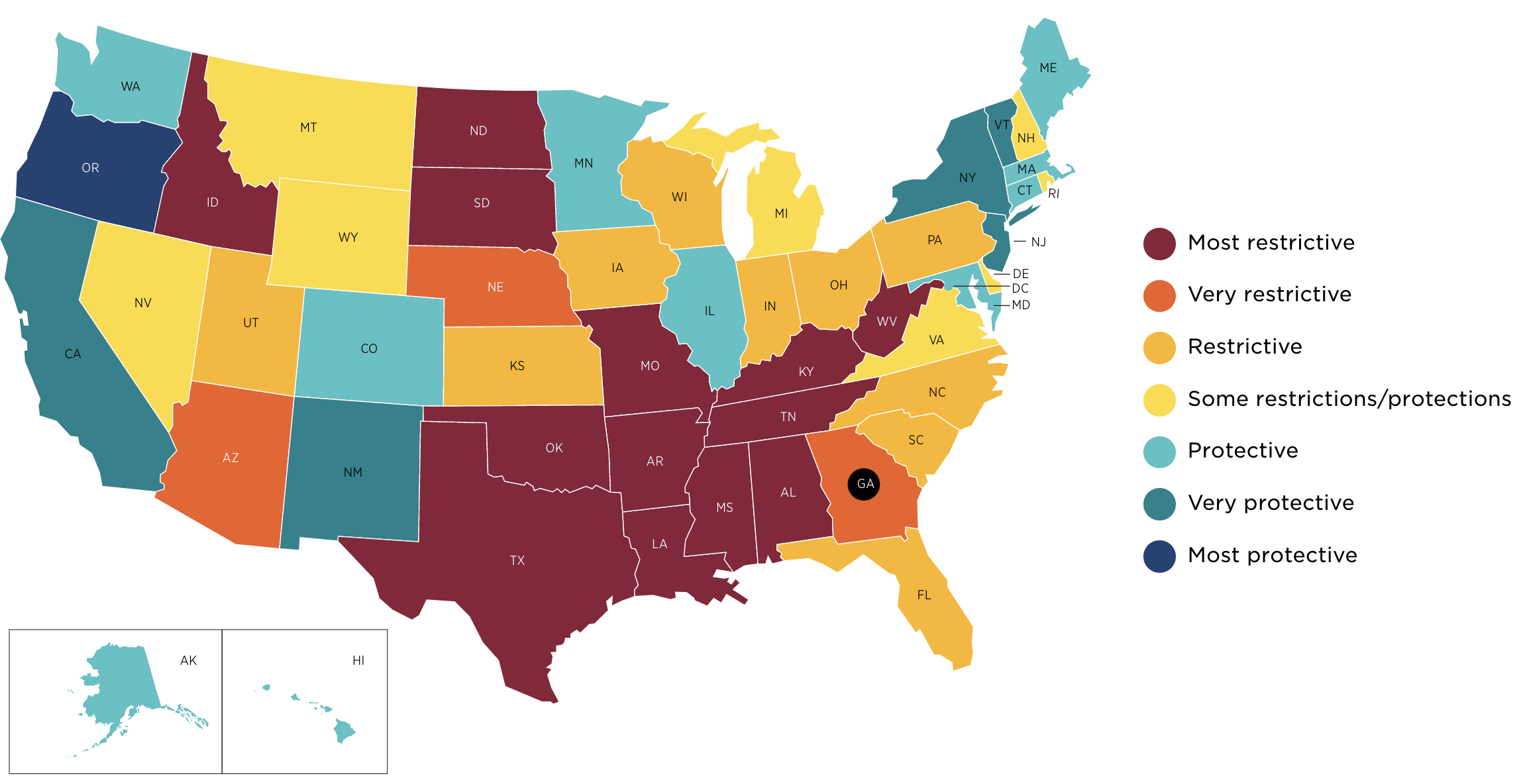
On June 24, 2022, The U.S. Supreme Court issued its decision on Dobbs vs. JWHO overturning Roe. This decision returned the right to regulate abortion care to the states. Following this decision, the Georgia Supreme Court ruled to allow HB 481, Georgia’s six-week abortion ban, to go into effect on July 20, 2023. This is the most recent of 13 medically-unnecessary and politically-motivated abortion restrictions, like required waiting periods, insurance coverage restrictions, and biased counseling, passed in Georgia since 2005.
Below, you’ll find a collection of events and programming to commemorate the impact of these restrictions and the hopeful future of abortion access in Georgia that we all deserve.
Abortion Restrictions Impact families young people trans folks queer folks mamas children
The overturning of Roe has had a detrimental impact on access to abortion care in Georgia and across the South, where the landscape of access is incredibly bleak.

This map from the Guttmacher Institute shows the level of restrictions on abortion by state. And the outcomes are still piling up. Most recently North Carolina passed a 12-week abortion ban and South Carolina a 6-week ban.
#WeCount found that since HB 481, Georgia’s 6-week ban on abortions, went into effect, abortions have fallen by half in our state. The Turnaway Study shows that denial of wanted abortion care results in long-term harm to both the person denied care and their child/children.
Georgia’s 6-week abortion ban means that the majority of people seeking abortion care have to travel out of Georgia for this care or are being forced to continue their unwanted pregnancies.
While the decision to end a pregnancy is personal and valid in any case, Georgians are also being denied care in life-threatening situations such as ectopic pregnancies and miscarriage, situations when care is supposed to be legal but hospitals are delaying or turning people away.
A recent report by the Association of American Medical Colleges found that there was a 10.7% drop in applications for OBGyn training in states with the most restrictive abortion bans. Since doctors often practice where they train, this could further exacerbate Georgia’s existing provider shortage.
A new report from ANSIRH on Care Post-Roe documents an increase in morbidity and pregnancy complications and delays in time-sensitive care as observed by doctors in states with abortion bans.
We envision Reproductive Freedom for Georgia
We are building a future where all Georgians live with an abundance of freedom. No matter our age, race, income, immigration status, or where we live, each of us will have the rights and resources to make our own decisions about whether, when, and how to build our families and raise them with dignity.
events Happening In Your Community
We want your involvement too
Do you have a coffee chat, discussion space, Instagram Live, or something similar to commemorate the one-year anniversary of the fall of Roe or the enforcement of HB 481?
Please share it with us and it might make its way right here on our public calendar of events for folks looking to take action around these anniversaries.
We look forward to amplifying your efforts!
What do you expect from your elected officials? What do they need to hear about how HB 481 has impacted you or loved ones? Help us paint a map of our state with your stories.
Comments will populate a public, interactive map of GA & be shared with legislators so they understand how these bans have impacted their constituents & how they can take action.
Let’s raise our voices together!
Click on a red pin on the map below to see testimonies, demands, and more about the impact of Georgia's 6-week abortion ban from the folks in your neighborhood.
What can you do right now?
If you’re waiting for an event to pop up on the day you’re free, here are some ways to get involved right now!

